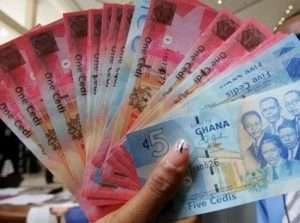The Sovereign credit rating downgrades of Ghana by Fitch and Moody’s led to “widened yield spreads on both cedi-denominated government of Ghana bonds and the country’s Eurobonds”, the Bank of Ghana has said.
“These downgrades reflect market and investor concerns about fiscal and debt sustainability”, Governor Ernest Addison told journalists on Monday, 21 March 2022 at the Monetary Policy Committee’s 105th meeting.
Consequently, Dr Addison said, “the Ghana cedi has come under severe pressure, as offshore investors exited positions in domestic securities at a time when domestic demand for forex has increased, reflecting both real and speculative demand”.
This, he noted, has caused the exchange rate “to overshoot its long-term trend”.
Dr Addison noted: “The strengthening of the US dollar, liquidity pressures, uncertainties regarding budget implementation, portfolio reversals by nonresidents and some speculative pressures are key contributory factors”.
Moody’s Investors Service downgraded Ghana’s long-term issuer and senior unsecured debt ratings to Caa1 from B3 and changed the outlook to stable from negative.
Moody’s said on Friday, 4 February 2022: “The downgrade to Caa1 reflects the increasingly difficult task the government faces addressing its intertwined liquidity and debt challenges”.
“Weak revenue generation constrains government’s budget flexibility, and tight funding conditions on international markets have forced the government to rely on costly debt with shorter maturity”, Moody’s noted.
Moody’s said its projection shows that more than half of the country’s revenue will go into the payment of interests for the next few years, and proposals by the government to fix the challenge does not seem to be feasible, especially given the fragile post-pandemic environment.
“While Ghana’s external buffers and moderate external debt amortisation schedule in the next few years afford the government a window of opportunity to deliver on its strategy, balance of payments pressures will build up the longer government’s large financing requirements have to rely on domestic sources,” it noted.
Apart from the long-term issuer and senior unsecured debt downgrade, Moody’s also downgraded Ghana’s bond enhanced by a partial guarantee from the International Development Association (IDA, Aaa stable) to B3 from B1, “reflecting a blended expected loss now consistent with a one-notch uplift on the issuer rating.”
It also lowered Ghana’s local currency (LC) and foreign currency (FC) country ceiling to respectively B1 and B2 from Ba3 and B1.
“Non-diversifiable risks are appropriately captured in an LC ceiling three notches above the sovereign rating, taking into account relatively predictable institutions and government actions, low domestic political, and geopolitical risk; balanced against a large government footprint in the economy and the financial system and current account deficits,” Moody’s said in its report.
About a month ago, Fitch also downgraded Ghana’s Long-Term Foreign-Currency Issuer Default Rating (IDR) to ‘B-’ from ‘B’ with a negative outlook.
Source: Classfmonline.com
 Home Of Ghana News Ghana News, Entertainment And More
Home Of Ghana News Ghana News, Entertainment And More





